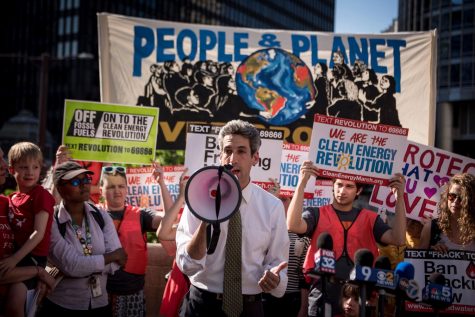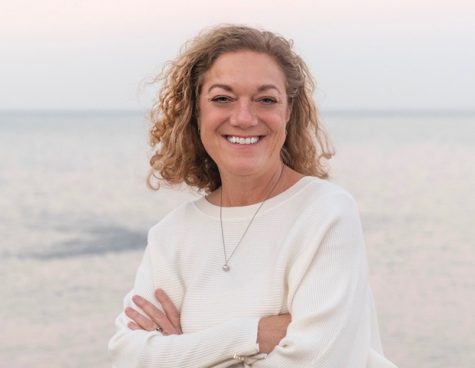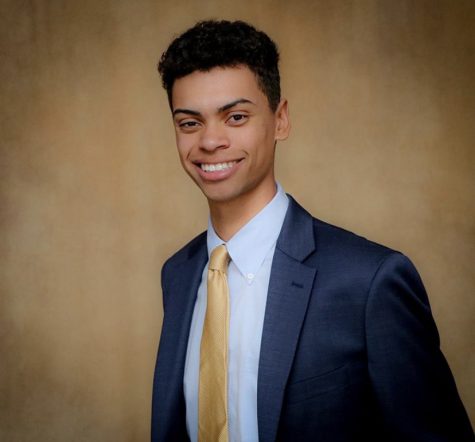Your donation will support the student journalists of the Evanstonian. We are planning a big trip to the Journalism Educators Association conference in Nashville in November 2025, and any support will go towards making that trip a reality. Contributions will appear as a charge from SNOSite. Donations are NOT tax-deductible.
The Mayoral Election
February 17, 2021

Daniel Biss
For those familiar with local politics, Daniel Biss’ name probably rings a bell. Serving as a state representative from 2011 to 2013 and then as a state senator from 2013 to 2019, Biss has plenty of experience in politics, experience he hopes to employ as Evanston mayor.
“I decided to jump in this race for mayor of Evanston because I see this as a really, really pivotal time, partially because of COVID-19 and all that the recovery from COVID is going to require, but partially because of the moment that we’re in that is giving us the opportunity, far too late, to begin reckoning in earnest with questions of racial justice, policing and what true shared public safety looks like and, frankly, questions of segregation and housing as well,” Biss said in an interview with The Evanstonian. “It’s an opportunity for a community like Evanston—that sees itself as progressive and wants to be a leader of the country—to do bold and exciting and transformational things.”
Biss has been campaigning with the understanding that racial justice, particularly in policing and police reform, alongside the fight against climate change are the two largest questions facing Evanston, questions he believes he can help answer.
“We need to develop a full audit of what the police doing [and answer] what needs to be done by police officers in the traditional sense, what needs to be done by somebody else altogether, how do we build up the capacity for that somebody else to be available and then what needs to be done by some kind of partnership, a co-response model…. Once you’ve made those three categories, you need to build up the capacity to actually do the work that way and start to deflect police responsibilities over to these other functions,” Biss said. “If you get all that right—which is a difficult, delicate, multi-step process—you’ve wound up providing a greater quality of police services and a greater level of truly shared safety at a lower cost. It’s a tremendous opportunity for the community.”
With regards to climate, Biss believes that the Climate Action and Resilience Plan (CARP) needs to be implemented and fully supports the work to accomplish those goals.
“[CARP] was enacted by the council a couple of years ago; it’s a really important document. But here’s what it does: it sets ambitious goals; it doesn’t actually solve the problem. Now that those goals have been set—I’m really thrilled that they have been set—we’ve got to do the hard part, decarbonizing our buildings and moving away from carbon in our electricity sources and changing our waste disposal mechanisms. That’s just a tremendous amount of really difficult, critical work that’s going to have to be done on an ongoing, continuous basis if we intend to actually meet the goals of CARP,” Biss said.
In addition, Biss supports the effort to reopen a school in the 5th Ward, both as part of the effort to address systemic oppression in Evanston and as part of his vision for what Evanston could be.
“I support [a Fifth Ward school]. I think neighborhood schools form a social anchor in the community, it creates social bonds in the community, it connects neighbors to each other and creates a greater safety net because people get to know each other on the walk to and from school, and they can look out for each other. It’s good for public health, for kids to be able to walk to school. I just think it’s really important,” Biss said. “The idea that we’re gonna help the communities that have been the victims of systemic racism by shutting down their institutions and then busing them somewhere else while the communities that have benefited from systemic racism won’t have to deal with any disruption, that’s bananas; that’s not a logical way to solve the problem given the vantage point of more thinking and a more modern understanding of what racism really means.”
While these goals are important, Biss understands that all of them will be large changes, changes that will take work and effort from the city and from community members to bring to fruition.
“All these things are, in my opinion, difficult and bold; none of them is going to happen without some pushback and some controversy. What I need to do is to, first of all, be clear during the course of this campaign about what I’m running on, so if I’m elected, it will be visible to the community that there really is public support for these ambitious agendas,and then work closely with experts in the community with activists, organizers and the nine members of the council to really move an agenda like this forward.”
Biss believes that the long-term impacts of such an agenda will transform Evanston into a community that can thrive and prosper as never before and can build it into a beacon for the rest of the country to aspire to.
“I see Evanston as a community that can be really thriving and its recovery from this pandemic and a city that can show the country what a truly bold and fearless agenda on racial justice looks like,” Biss said. “Twenty years down the road, I think we have an unbelievable set of assets in this town that will only become that much more extraordinary as the effects of climate change began to harm the world more…. I would like to see Evanston move to be a more communal, walkable, large neighborhood. There’s a vision of what’s called a 15-minute city, which is the idea that we should all be able to access our true necessities within 15 minutes from our home. That means everyone has a school that they can walk to; everyone has access to healthy food and other clear necessities. That allows for a kind of density and affordability and a community feel where we support one another.”
“Four years from now, we might look back with incredible pride at having gotten it right, and it’s also possible that, four years from now, we could look back and feel kind of disappointed at ourselves that we didn’t put in the work and effort to get these things right. The next mayor is going to help determine which of those two paths we land on. That’s the whole point of public service, to help lead a community to make the right choices when the stakes are high, and that’s why I’m so excited about what this job could mean.”

Lori Keenan
Long-time Evanston resident Lori Keenan is excited to be running for mayor in the upcoming municipal election.
Keenan has spent the past 22 years living in Evanston with her husband and three children, all ETHS graduates. She balances her time between her principal role in a women-owned marketing and public relations business and volunteering with various grassroots organizations throughout the city. Although Keenan’s campaign marks her first involvement in government, she was inspired to run in the hopes that she could help enact real change within the city and bring new ideas to the table.
“I truly believe that what you bring to your community, the passion and energy are really, really good. I’m concerned because it feels like some of the city council is not listening to the public. The current mayor even ignores people and called them CAVE people, citizens against virtually everything. You can’t solve new problems with old ideas, [you need] fresh blood and new leadership,” Keenan said. “It’s exciting to see new faces, fresh ideas.”
Prior to her run for mayor, Keenan has been involved with multiple volunteer organizations around Evanston. Her past volunteer work includes advocacy for creating a west side branch of the Evanston Public Library and working to protect the library’s budget from being cut. Keenan believes her deep involvement with community-based organizations will help her as mayor to listen to the different voices of Evanston residents.
“I feel like I’ve really been in the trenches; I’ve been very involved in a number of different ways…. I always feel like when you see these sort of grassroots movements, they really reflect what the community wants, what the public wants. It’s complicated, and I feel like we need somebody who has really focused on Evanston,” Keenan said.
At the core of her campaign is Keenan’s outspokenness about the issues she feels are most pressing to address among Evanstonians, including tackling the livability and environmental stability of Evanston.
“Affordability and livability. That can be as big as affordable housing or big as parking; if parking becomes untenable or expensive, or whatever else, I don’t think that’s helping our independent businesses. I don’t think it’s helping our downtown,” Keenan said. “When we talk about sustainability and the Climate Action and Resilience Plan [CARP], let’s really capitalize on that…. How can we attract sustainable businesses as a model?”
CARP is a plan adopted in December 2018 to guide Evanston in the fight against climate change. This plan includes strategies for climate mitigation and resilience with a focus on carbon neutrality by 2050. Keenan hopes to expand on the implementation of CARP and hold Evanston accountable for taking action to combat climate change.
A major discussion point among Evanstonians is equity and the creation of equitable spaces, an issue Keenan feels very passionate about as a mayoral candidate.
“There are certainly progressive issues that are also Evanston issues, but I don’t think that we can create a blanket policy, because Evanston is so unique and has so many different nuances,” Keenan said.
Evanston is a unique community with its own strengths and challenges, thus when considering national issues—such as systemic racism and climate change—it is important to consider Evanston’s diversity to create plans that work for everyone.
“How does Evanston do this? Yes, this is a national issue, but what can we do in Evanston? What are our strengths and challenges here? Because I think it’s not a one-size-fits-all,” Keenan said.
More recently, youth movements, including groups in Evanston, have been gaining attention as they work to mobilize people for actions around different important issues. Evanston is home to many youth activist groups, including Evanston Fight for Black Lives and E-Town Sunrise and Talking Whiteness on Central Street. 16.8 percent of Evanston residents fall into the youth demographic, an age group Keenan hopes to work alongside and share ideas with.
“I have kids who recently went through the high school. I understand that population really well,” Keenan mentioned.
Keenan acknowledges the importance of Evanston’s youth voices and wants to highlight the role that they play in the political dynamic by inviting them to be part of the conversations about making changes in the city.
“They’re often educating me way more than I am them, and I think that we should really be bringing them into the mix,” Keenan said. “I think that youth voices are informed and intelligent people who know how to do things. They’re the future, and I feel like the future’s bright, especially in Evanston, which is such a unique place. You’re so lucky [to have] such a formative experience…. and we should be really capitalizing on what they bring to the picture.”
Although this is her first time entering the world of public service, Keenan feels prepared to take on the challenges that come with being mayor. She is confident in her ability to draw on years of experience working with others in both volunteer and professional settings to help her work with aldermen and Evanston residents to create a city reflective of its people.
“I think that we need someone who has been on the frontline here, lives and breathes it every day. I feel like I’ve done that…. because I dare and I think that we need elected officials who aren’t insulated, but who are among people and who are listening and trying to work within the parameters we have,” Keenan said. “ I really think it needs to take someone who is of the people and someone who’s been listening for a long time to make a change.”
* This profile was originally published on Dec. 14, 2020 and subsequently edited for publication on Feb. 17.

Sebastian Nalls
Recent ETHS alumnus Sebastian Nalls is hoping to go from 1600 Dodge to 2100 Ridge—in the Mayor’s Office.
Nalls, currently a junior at Purdue University, announced his campaign on Aug. 29 urged on by the city’s choices with regards to the Robert Crown project and the eruption of protests following the murder of George Floyd.
“One of the base reasons for running were the issues that came from the funding that Robert Crown was receiving, particularly the $400,000 donation that they received back in 2018…. I’ve gone to Robert Crown my entire life from preschool to summer camps. I was [asking] who’s gonna be primarily impacted by this decision, and that was minority youth that lives in the area,” Nalls said. “Another [key] moment was the protests following George Floyd’s death and the reaction from the city and some of the city council members. Both of those combined were kind of my driving force.”
Nalls has previously worked for the City of Evanston, directing multiple programs since the beginning as a counselor-in-training while at ETHS; Nalls believes this experience with the city structure will help guide his decisions once in office, decisions that will be based around the needs of the community.
“I want to make sure that I am an advocate for individuals in the community. The scope of mayor is pretty narrow, and it doesn’t have much power—it’s mostly the city council and the city manager that do most of the heavy lifting when it comes to city governance—so being an advocate for the people is something that I really want to achieve while in office,” Nalls said.
The same issues of inequity that are at the core of Nall’s choice to run are front and center in his mission statement to address racial justice and equality, fiscal policy and increased early childhood education funding.
“Racial justice is at the forefront of our campaign. [It’s] something that we’ve been focusing a lot on because it stems to other issues such as violence in the community and [fiscal policy],” Nalls said. “One of the things that we’re pushing for is the reduction in police funding to fund the Parks and Recreation Department, the Community Development Department, as well as the Health and Human Services Department. By redistributing those funds and further expanding those departments, we can focus on areas that have been marginalized throughout the decades here in Evanston, and proceed to make Evanston a more equitable place by providing more economic opportunities in these neighborhoods.”
Another issue close to Nalls’ heart is environmental stability, something he feels the city has failed to properly implement following the passing of the Climate Action and Resilience Plan (CARP) in late 2018.
“CARP was adopted back in 2018, but it hasn’t really been implemented to the full scope of actually going through and changing some of our city buildings to rely on renewable energy. That’s something that we’re looking forward to, the actual implementation of that plan,” Nalls said.
Equally as important as policy, Nalls hopes to create and maintain healthy, working relationships with youth activism groups in Evanston, such as Evanston Fight for Black Lives and E-Town Sunrise, something which many have accused Mayor Steve Hagerty of failing to do.
“Youth activists, especially here in Evanston, have spurred this movement…. It’s extremely important that these individuals are out in the community, being activists for something that they believe in…. Having a good line of communication, talking to these groups, is probably the most effective thing to do as mayor, and it’s ultimately one of the duties of the mayor as well,” Nalls said.
Mobilizing these groups, and others like them is crucial in Nalls’ view of Evanston’s future: one that acknowledges the faults of the past and actively strives to heal the divides that exist, particularly with regards to the history of discriminatory housing policy in the city.
“There’s always been the [belief that] all the things that are happening in Minneapolis, Louisville, Chicago can’t happen in Evanston because we’re so diverse, but people often forget that African-Americans had been redlined into various wards all over the city less than 50 years ago. We are still seeing the ramifications of doing that…. We’ve taken strides in the right direction since then, but there is still a lot of work to be done here in Evanston,” Nalls said. “As a city where we pride ourselves on being so diverse, so equitable, we need to actually speak on it and act on it… [producing] the necessary legislation to ramify and heal that process.”
The campaign trail may be a challenging one, but it is a challenge that Nalls is ready to rise and face. It is a challenge that stretches beyond his campaign, calling upon all Evanstonians to reach for the future that lies ahead.
“What we’re trying to achieve is [rooted in] a movement that is bigger than me; it encompasses everyone who seeks to have meaningful change in Evanston. Our campaign will bring more meaningful change to Evanston than what we’ve seen in the past,” Nalls said. “We want to come to the table, bring alderman together and say, ‘These are issues that the community is facing; we need to act on them. We need to change something because, at the end of the day, we can’t just keep having the same [broken] system.’”
Nalls has received Evanston Fight for Black Lives’ endorsement for mayor.
*This profile was originally published on Oct. 20, 2020 and subsequently edited for publication on Feb. 17.
